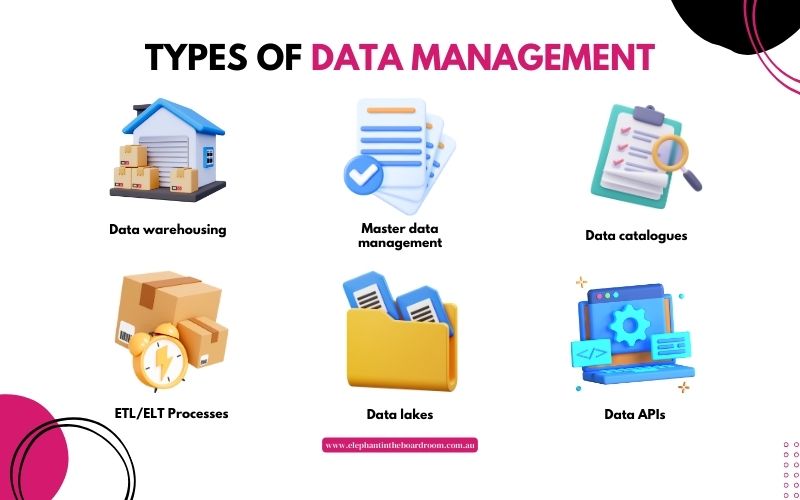
A Beginner's Guide to Data Management
Data management should be an integral part of every business, including yours. In today's world, businesses are inundated with a flood of information—from customer purchases to website clicks. But here's the catch: if this data isn't organised and used effectively, it's more of a murky mess than a treasure trove.
Thankfully, data management is here to save the day. It's the art of organising your countless amount of data into a usable format so you can unlock its true potential. And when done properly, it can completely transform your business!
And that's why we're here to help you achieve business possibilities through your data! Let's explore why data management matters for your business and how you can do it in this comprehensive blog!
What’s Inside?
- What Is Data Management?
- Why Is Data Management Important?
- Types of Data Management
- Data Management Process
- Managed Data Means Manageable Business!
What is Data Management?
Feeling overwhelmed by all the data you have? Don't worry—once you learn the ins and outs of data management, it becomes much easier to handle. Let's dive into the world of data management and see how it can simplify your business.
Data management is all about handling your business's data as a valuable asset. It's the process of collecting, organising, protecting, and storing that data so it can be effectively used for things like:
Making Informed Decisions
Data analysis can reveal trends and patterns that would be difficult to see otherwise. This can help businesses make better choices about everything, from product development to marketing campaigns.
Improving Efficiency
By having well-organised data, organisations can streamline their operations and save time and money.
Ensuring Compliance
Many regulations, including our Australian government, require businesses to store data securely and for a certain time. Data management helps your business meet these requirements, making sure you only utilise the data at hand for its intended purposes.
Why is Data Management Important?
Around 95% of businesses believe that their unstructured data is a problem when running their business. This only strengthens the importance of having data management for your business.
Data management is becoming increasingly important as businesses collect more and more data. Here are some reasons why you should have a data management mechanism for your business.
Better Decision-Making
By managing your data, it gives you a reliable basis for your business decisions. It gives you clear, accurate information to support your decisions. This leads to appropriate data solutions, better marketing campaigns, improved product development, and more efficient operations.
Increased Revenue and Customer Satisfaction
Happy customers mean more money in the bank. By understanding your customers through data analysis, you can tailor your offerings and marketing to their needs.
Saves Time and Money
Data management also helps you streamline processes and avoid wasting time searching for lost information. Imagine how much more productive your team could be if they weren't constantly digging through spreadsheets!
Reduced Risk
60% of businesses say they lose significant revenue yearly due to inaccurate and mismanaged data. Effective data management helps you protect sensitive information and comply with data privacy regulations. It also builds trust in your customers, knowing their data is safe with you.
Types of Data Management

Managing your business data becomes a breeze with the right tools and techniques to compile, curate, and organize your data efficiently and quickly. Here are some tools to consider:
- Data Warehousing: This creates a central repository for all your data, making it easier to access and analyse.
- Master Data Management (MDM): MDM tools ensure consistency across different versions of the same data, like customer records for example.
- Data Catalogues: These act like an electronic library card system for your data, helping users find what they need.
- ETL/ELT Processes: The Extract, Transform, Load (ETL) or Extract, Load, Transform (ELT) tools move data between different systems and formats.
- Data Lakes: These are massive repositories for storing raw data in its original format, allowing for flexible analysis later as soon as you use these for your business strategies.
- Data APIs: APIs (Application Programming Interfaces) allow different applications to share data seamlessly with your business, empowering its data utilisation for marketing purposes.
Data Management Process
Data management might seem daunting for your business, but it's actually simpler than you think. Here are five easy steps to help you manage your business data effectively.
Gathering Data Sources
List out all your data sources – customer records, marketing tools, social media platforms, etc. This helps you understand what data you have and where it's coming from.
Knowing Your Data Management Goals
What do you want to achieve with your data? Better customer targeting? Improved operational efficiency? Defining your goals will guide which data is most important.
Organising Your Data
This is where you create a system for storing and managing your data. It involves using a central data repository, implementing naming conventions for files, and setting up data quality checks.
Prioritising Accessibility
An important reminder: Don't lock your data away! Develop a user-friendly system for employees to access and analyse the data they need. Think dashboards, reports, or data visualisation tools.
Keeping It Secure
Data breaches are a big threat, especially for your business that serves a lot of customers. Put safeguards in place to protect your data, such as access controls, data encryption, and regular backups.
Managed Data Means Manageable Business!
Look, data management can seem daunting at first. But don't worry, you won't do it alone anymore. Here at Elephant in the Boardroom, we can help you develop a data strategy that aligns with your business goals, implement the right tools and processes, and ensure your data is secure and accessible.
Ready to unlock the power of your data? Let's chat! Contact Elephant in the Boardroom today for a free data and AI consultation. Together, we can turn your data into a strategic advantage.





















